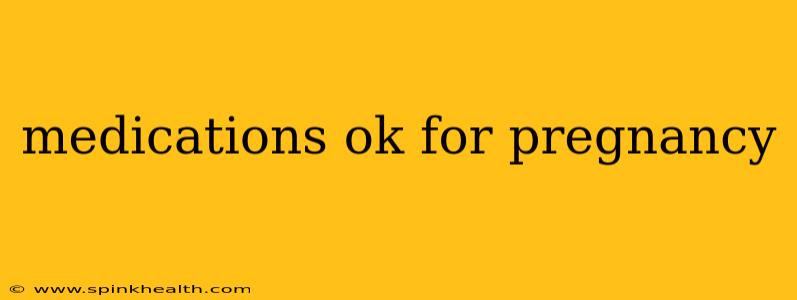Navigating Medications During Pregnancy: A Journey Through Safety and Considerations
Pregnancy is a transformative journey, filled with joy, anticipation, and, let's be honest, a fair share of anxieties. One significant concern for many expectant mothers revolves around medication. Taking medication during pregnancy can feel like walking a tightrope—the need for relief versus the potential impact on the developing baby. This comprehensive guide aims to shed light on this delicate balance, providing information and empowering you to make informed decisions in consultation with your healthcare provider. Remember, this information is for educational purposes only and should not be considered medical advice. Always consult your doctor or midwife before taking any medication during pregnancy.
What Medications Are Safe During Pregnancy?
This is arguably the most crucial question, and the answer, unfortunately, isn't a simple list. The safety of a medication during pregnancy depends on many factors, including:
- The specific medication: Different medications have different effects on the developing fetus. Some are relatively safe, while others pose significant risks.
- The trimester of pregnancy: The risks associated with medication can vary throughout the pregnancy. The first trimester, when organ development is crucial, is often considered the most sensitive period.
- The dosage: Even medications generally considered safe can pose risks at high dosages.
- The mother's overall health: Pre-existing conditions and the mother's overall health can also influence medication safety.
Instead of providing a list (which would be incomplete and potentially misleading), let's focus on the principles guiding medication choices during pregnancy. Your doctor will assess your individual circumstances and recommend the safest and most effective treatment option.
What Over-the-Counter (OTC) Medications Are Safe During Pregnancy?
Many expectant mothers rely on OTC medications for common ailments. However, even these seemingly harmless drugs require careful consideration. Generally, medications considered relatively safe for use in limited quantities and under specific circumstances include:
- Acetaminophen (Tylenol): Often considered safe for pain and fever relief in moderate doses. Always follow the recommended dosage.
- Certain antacids: For heartburn and indigestion, certain antacids may be acceptable. Your doctor can advise on suitable options.
Crucially, even these medications should be used sparingly and only after consulting your doctor or midwife. Many other OTC medications, including cough suppressants, decongestants, and pain relievers, may pose risks and should be avoided unless specifically recommended by a healthcare professional.
Are There Medications That Should Be Avoided During Pregnancy?
Yes, absolutely. Several classes of medications are generally considered unsafe during pregnancy due to their potential to cause birth defects or other complications. These include, but are not limited to:
- Nonsteroidal anti-inflammatory drugs (NSAIDs): Such as ibuprofen (Advil, Motrin), these can pose risks, especially later in pregnancy.
- Certain antibiotics: While antibiotics are sometimes necessary, some can have negative impacts on fetal development.
- Many prescription medications: This encompasses a wide range of drugs, including those for acne, anxiety, depression, and more.
This list is not exhaustive. Always discuss any medications you are taking or considering with your healthcare provider before, during, and after pregnancy.
What About Herbal Remedies and Supplements During Pregnancy?
The use of herbal remedies and supplements during pregnancy is a complex issue. While some may seem harmless, many lack rigorous scientific research on their safety during pregnancy. Therefore, it's crucial to avoid all herbal remedies and supplements unless explicitly recommended by your healthcare provider. They can interact with other medications and may have unexpected effects on the developing fetus.
How Can I Find More Information About Medication Safety During Pregnancy?
Several reliable resources can provide more detailed information on medication safety during pregnancy. Your doctor or midwife is your primary source of information. You can also consult reputable sources like the following:
- Your doctor or midwife: This is your most trusted source of personalized advice.
- Your local pharmacist: Pharmacists can provide valuable information about medications and their potential interactions.
Remember, your health and the health of your baby are paramount. Open communication with your healthcare provider is key to making informed decisions about medication during pregnancy. Your journey to motherhood deserves all the support and care you can receive.

